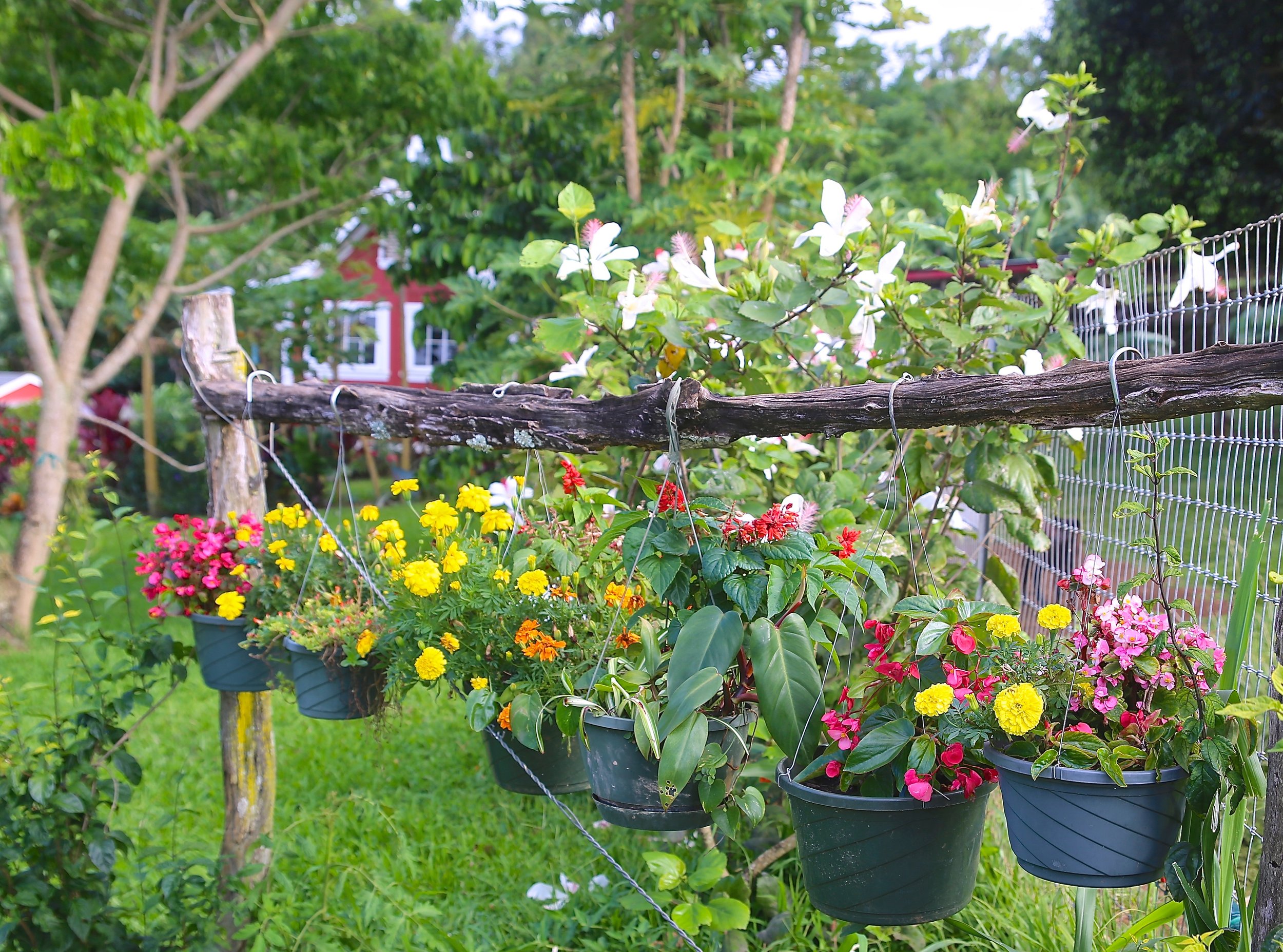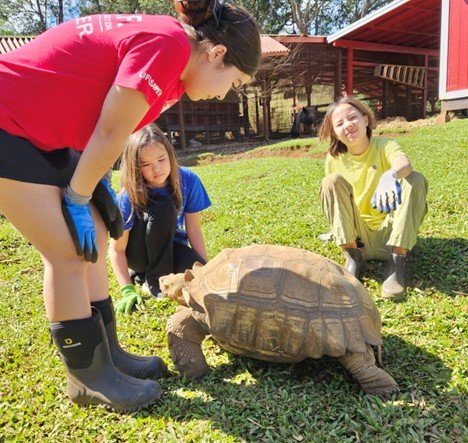Farm Tour Highlights
What to Expect on Your Farm Tour
Background
The nearly eight-acre Leilani Farm Sanctuary was established by Founder Laurelee Blanchard when she learned about the cruel treatment of animals raised for food on factory farms and in slaughterhouses. Our mission is to give visitors an opportunity to meet and interact with friendly farm animals and see them as individuals with personalities, rather than potential meals.
Leilani Farm Sanctuary a safe haven for rabbits, goats, cats, chickens, ducks, geese, pigs, turkeys, tortoises, deer, a swan, sheep and guinea pigs. Each animal was rescued and has a unique story. Here are highlights you will encounter on a tour.
The Grounds
The Grounds
Leilani Farm Sanctuary is adorned with botanical gardens where colorful, tropical plants abound. The grounds of the Sanctuary are well-tended, showing an artistic display of flowering plants with splashes of color. Upon arriving, visitors walk along an enchanted pathway adorned with statues, as well as food plants for the animals, such as papayas, pineapples and bananas. Puakenikeni trees bloom profusely with fragrant flowers that can be woven into Hawaiian leis.
Botanical Gardens
A sublimely beautiful mix of ornamental plants, meandering paths, raised-garden beds, statuary, picturesque barns, and stone walls greet visitors; and a large pond with an idyllic waterfall overlooks a sweeping view of the Pacific Ocean.
The farm showcases varieties of ti, ginger, hibiscus, Jamaican Liliko’i, bromeliad, allamanda, bougainvillea, palm, Canna Lily, heliconia, anthurium, and philodendron, among other ornamentals.
The gardens complement the quaint architecture and the eight heavenly acres upon which they grow and flourish. Here, the “aloha spirit” shines through in a riot of color that suffuses the broad range of floral varieties.
Food Crops
Bananas, mangoes, coconuts, papaya, guava, pineapple, avocados; and exotic fruit trees including Sirinam cherry, provide food for the animals.
Permaculture
Permaculture to create highly efficient self-sustaining ecosystems is actively practiced here. Fruits and vegetables containing seeds are fed to the animals. Manure is collected and the seeds sprout in the compost bins, becoming new plants such as melons, papayas, peppers, tomatoes, and other food crops that sustain the animals.
Straw from the barns and animal manure is collected daily and deposited in the compost bins—transforming organic matter into the rich, fertile soil that will be used for the gardens.
The Animals
Pigs love to submerge themselves in mud holes. The mud serves to keep them cool, prevent sunburn, and keeps insects away. Charlotte escaped from a pork farm with her family and was living along the Hana Hwy when hunters shot and killed most of her siblings. Charlotte was caught in a snare and suffered a fractured leg. Pigs are highly intelligent and have cognitive abilities equal to a three-year old human. Sweetie-Pie was a young feral pig who may have been running from hunters. He broke through the perimeter fence into the Sanctuary. He was determined to stay!
Guinea pigs were brought to us from the Maui Humane Society. Because of the absence of predators on the island, the guinea pigs and rabbits get to enjoy outdoor habitats. The cats are nice to them. The perimeter of the Sanctuary is fenced.
Laurelee’s cottage is only 633 square feet, but it looks bigger because Laurelee included a wrap-around porch built to accommodate lots of cat beds. We have forty plus cats, all spayed and neutered. Most of them were rescued after being abandoned at feral cat colonies.
Turkeys Gregory and Matthew were saved from the butcher’s knife just before Thanksgiving. They love hugs.
The Chicken aviary is 2,200 square feet and outfitted with roosting perches, nesting boxes, and fresh straw. Many of our hens had been crammed into tiny cages and exploited for egg production. Many of the roosters were liberated from cockfighting compounds. Cockfighting is illegal in Hawaii, but prevalent because the crime is classified as only a misdemeanor. Many of our chickens were rescued as stray or orphan peeps and received a lot of cuddling.
Animal Alley was built to enable the animals to circumvent Laurelee’s cottage and travel from their barn where they sleep at night, to the pastures where they graze during the day.
Goats: Many were orphaned when their mothers were shot by hunters. They had to be bottle-fed.
Deer were orphaned when hunters killed their mothers. They were bottle-fed.
Rabbits: Some of the rabbits originated as Easter presents for kids. The kids became tired of the responsibility of caring for the rabbits, so the parents took them to the animal shelter. We encourage people to not buy rabbits from pet stores or breeders, but to adopt them from an animal shelter instead. The Maui Humane Society brings us rabbits and guinea pigs when they are beyond capacity. Rabbits need a large space to exercise. If outdoors, that space needs to be protected from predators.
After the Tour
You are welcome to spend more time at the sanctuary after the tour. Also, you may consider sponsoring an animal. Your monthly donation will provide food, shelter, and veterinary care for the animal.
Adults receive a Leilani Farm Sanctuary brochure “Compassionate Choices” booklet that features great cruelty-free recipe ideas. Children are provided “Kids Guide to Helping Animals” magazines.
T-shirts and tank tops are $20. Original artwork and photography are also available for purchase.
We hope to see you soon!
Mahalo.

Tour The Farm
Experience an unforgettable adventure in paradise with a personalized guided tour at Leilani Farm.
Click “Book Now” to view availability.
Six Ways to Give
Your sustaining support helps us provide food, shelter, and veterinary care for rescued animals; and humane education to the community.
Donate to Leilani
Contributions are tax-deductible and go directly toward our life-saving work at Leilani Farm Sanctuary.
Sponsor an Animal
Help us provide care for a rescued animal and receive an “adoption” certificate with a picture of your sponsored animal.











